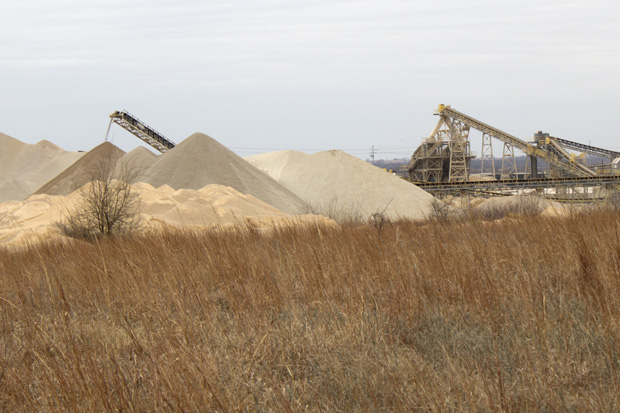New Severance Tax on Limestone Miners Passes Oklahoma House
-
Logan Layden

Logan Layden / StateImpact Oklahoma
An active aggregate mining operation near Mill Creek, Okla.
South-central Oklahoma — where the sensitive Arbuckle-Simpson Aquifer provides water for thousands of Oklahomans — is home to some of the highest quality limestone in the country, and the ground holds vast supplies of the silica sand used by the oil and gas industry in the hydraulic fracturing process.
For years, south-central Oklahoma lawmakers have been pushing for a severance tax on the limestone and sand mined out of the aquifer, which many residents say is damaging the Arbuckle-Simpson and threatening the future of communities in the area. On Tuesday, a severance tax bill passed the state House by a vote of 60-35.
Many of the mining companies working in the aquifer are based in Texas, and much of the material mined goes to construction projects in the growing Dallas area.
There’s very little in that deal for Oklahoma, and that’s what HB 1775 is all about. It would allow individual counties to decide if they want to impose a fee of up to 15 cents per ton and put it to a vote of people in that county.
But raising taxes, even in the guise of a voter-approved fee, is a tough task in red-state Oklahoma. This is the third year Rep. Charles McCall, R-Atoka, has authored a severance tax bill, and this is the first time it has made it through the House.
The issue provided for some strange optics on the House floor. During debate, there was McCall, a Republican, pushing for allowing counties to impose this tax, while Rep. Wade Rousselot, a Democrat, railed against it.
“Did I mention this is a tax? I’m not sure I mentioned this is a tax,” Rousselot said after mentioning that HB 1775 is a tax a number of times. “This legislature is going to decide whether or not we’re going to enable a tax increase.”
McCall, a Republican, took issue with that, saying his bill is all about local control.
“The problem at the heart of this issue is that these minerals that are severed — there is no financial benefit for the counties that lose these,” McCall said. “We are not imposing a tax today. We are doing nothing more than authorizing the people who elected us to make the decision that is best for their county.”
McCall says he doesn’t expect all of Oklahoma’s counties to vote on the issue, but as StateImpact has reported, his county, Johnston County, produces more of the minerals than any other, and residents want some kind of return:
“The mines just continue to expand,” says Gary Green, whose ranch is near one of the mining operations.” We actually have a mine that’s from Germany that’s been trying to operate, more mines from Texas coming in.”
Green drives on county roads pockmarked by trucks loaded with limestone, and through clouds of dust thrown up by rock being crushed into gravel and sand.
“When I first came here, back to the west there were very few lights. It was dark. You could see the stars. Now when I drive in my driveway, back to the west, it looks like a small city from all the lights from the mines,” Green says.
